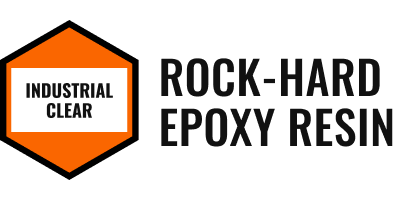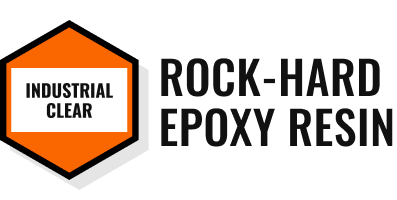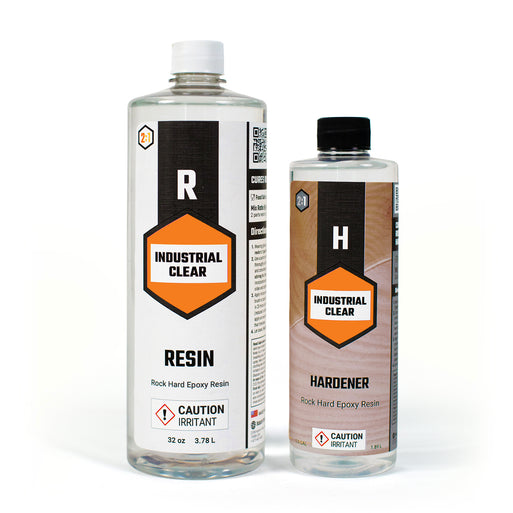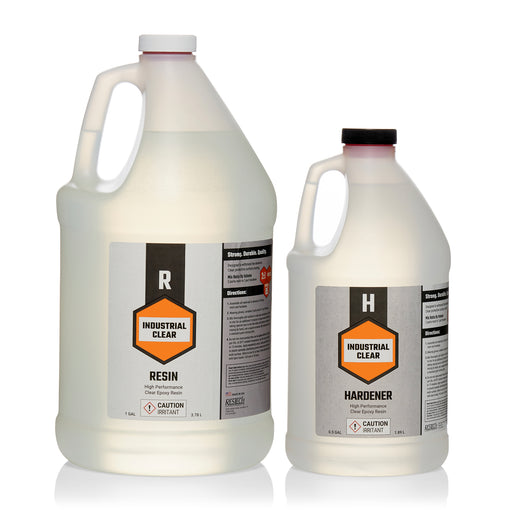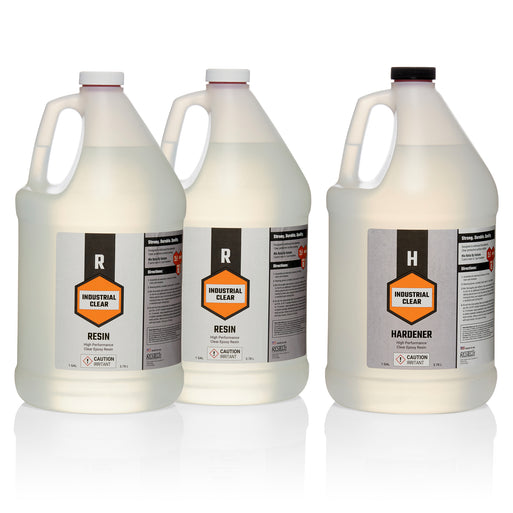Food Safe Epoxy Guide
Epoxy resin has grown in popularity in recent years, adorning everything from artwork and home decor to charcuterie boards and countertops. But how can you be sure that the epoxy resin you're using is safe, especially for food contact?
Let's take a closer look.

What Is Food Safe Epoxy?
Food-safe epoxy means that the product is free from harmful ingredients that could leach into food that it comes into contact with it, and that when prepared according to the label instructions and fully cured, the epoxy is inert. To confirm that an epoxy is safe for food contact, it must undergo extensive migration and leaching testing by an independent, third-party lab, and the test results must demonstrate compliance with government food safety regulations.
Is Epoxy Food Safe?
There are many different epoxy resin brands on the market, but not all are safe for food contact. Some epoxy resin formulas contain hazardous materials used to stretch out the materials and reduce the cost. These fillers are typically solvents and can leach out of the product and pose serious health risks if ingested.
Are All Epoxy Resins Food Safe?
No, not all epoxy resins are food safe. Many brands include solvents and non-reactive diluents such as benzyl alcohol, which can have leach out after curing, causing negative effects on your health. Epoxy resins containing these harmful ingredients should be avoided for products intended for food contact.
Industrial Clear epoxy resin, however, is specifically designed to be food safe once cured. The product is a complete system, meaning everything in the formula bonds together, leaving nothing behind that could release into the air or leach into food. The formula is entirely free from solvents, non-reactive diluents, and Volatile Organic Compounds (VOCs). Industrial Clear has also undergone rigorous testing according to government food safety standards and successfully passed. With no harmful VOCs in the product, there is no chance of VOC emissions after curing.
⚠️ PLEASE NOTE that even an epoxy designed for safe food contact, like Industrial Clear, may lose its food-safe status if not prepared according to label instructions. Factors such as incorrect mixing ratio, under-mixing, adding colorants, or other additives, and putting your project into use before it has fully cured can compromise food safety. If you wish to add colorant to the epoxy, please apply a layer of clear Industrial Clear over top as a final top coat.

How Can You Check If Epoxy Resin Is Food Safe?
The best way to check if the epoxy resin you're using is food safe is to ask the manufacturer if their product has undergone (and passed) leaching and migration testing according to government food safety standards.
Some of the most established food safety certifications for epoxy resin are:
- US: FDA 21 CFR 175.300 Resinous and Polymeric Coatings
- EU: Food Contact Plastics Regulations EU 10/2011
- GB: GB 4806.7-2016 National Standards For Food Safety
- AUS: AS 2070-1999 Plastic Materials For Food Contact Use
- CA: Canada Consumer Product Safety Act SOR 2018/83
Is Epoxy Food Safe After It Dries?
Yes, epoxy is considered food-safe only after it has fully cured, provided it has been prepared according to the manufacturer's instructions. Keep food or beverages well away from the resin and hardener in their pre-cured, liquid form. Epoxy resin is not edible or potable in either liquid or cured form.
Is Epoxy Safe To Eat Off Of?
An epoxy resin like Industrial Clear that has been properly prepared, cured, and tested to meet FDA 21 CFR 175.300 food safety testing standards is safe for direct food contact Direct contact includes "producing, manufacturing, packing, processing, preparing, treating, packaging, transporting, or holding food."
Simply put, if you've measured and mixed a food-safe epoxy according to the manufacturer's directions, have not added pigments (or you've applied a clear top coat over tinted epoxy), and have allowed the epoxy to fully cure, then yes, you can confidently serve food from the cured surface.
⚠️ Please note that cured epoxy surfaces are not suitable for contact with very hot objects or for use as a cutting board. Hot items, such as dishes right out of the oven, can burn or warp cured epoxy. Additionally, the cured resin surface can be scratched by any sharp object that can scratch glass.

Is Food Safe Epoxy Safe-For Coating?
Yes, food-safe epoxy is safe to use as a coating providing the epoxy has been correctly measured and mixed and allowed to fully cure as per the instructions. It's important to note that if pigments have been added to the mixture, the epoxy is no longer considered food safe. In this case, we advise applying a clear layer of epoxy as a final top coat.
Is Epoxy Food Safe On Wood?
Yes, a food safe epoxy resin transforms ordinary wood into a stunning surface that is safe for food contact. Epoxy resin not only enhances the look of wood, but also provides long-term protection. Industrial Clear is a food-safe epoxy resin suitable for preparing charcuterie boards, serving trays, fruit bowls, epoxy resin table tops, countertops, coasters, candy dishes, plates, tableware, and many other items intended for serving or storing food.
💡 TIP: For more information on coating wood with epoxy, see our blog 10 Tips When Using Epoxy Resin On Wood.
Is Epoxy Food Safe On Metal?
Yes, Industrial Clear is food safe once applied to metal, as long as the resin has been prepared according to the label directions and allowed to fully cure.
Industrial Clear has great adhesion and will bond well to metal, creating a strong, waterproof seal that is easy to clean. For best results, ensure the metal surface is clean and free of dust and grease. As with wood, if you wish to tint the epoxy resin or add any other additive, please apply a clear layer of Industrial Clear as a final top coat.

Can You Put Food In Resin?
Yes, certain food items can be embedded in epoxy, but we always advise conducting a sample test first. It's important that the food is thoroughly dry, as moisture will cause it to rot in the resin. For items that can absorb epoxy, like cookies, sealing them first is recommended. Additionally, be aware that colors may run on items that containing food coloring, such as candy, sprinkles, or cake fondant, and these should be sealed before embedding.
What Is BPA?
The main area of concern when it comes to plastics and food safety is BPA. BPA stands for Bisphenol A; a chemical compound used to manufacture clear and durable epoxy resins and other polycarbonate plastics that come in direct contact with food products. Some studies have shown that BPA might be connected to specific health problems, however, the United States Food and Drug Administration (FDA) has declared that BPA is safe at very low levels.
Is Industrial Clear BPA-Free?
We are happy to report that Industrial Clear epoxy resin is BPA free. Although BPA is a precursor to epoxy, it is fully reacted during the manufacturing process, leaving behind trace amounts so low that it is considered BPA-free.
Additionally, once Industrial Clear's resin and hardener combine and cure, they fully react, leaving nothing behind that can become airborne, including those miniscule amounts of BPA.
Key Takeaways
-
Not all epoxy resin brands are food-safe or suitable for items intended for food contact. Choose a designated food-safe epoxy resin like Industrial Clear for safe use on surfaces in contact with food.
-
If you're uncertain about an epoxy brand's food-safety status, inquire with the manufacturer about the results of their migration or leaching test. Reputable manufacturers, who have conducted and passed such tests, will be happy to share this information with you.
- To ensure the food-safety designation is not compromised, it's important to follow the label directions: measure accurately, mix completely, and allow the product to fully cure before use.
-
Adding pigments or other additives to the epoxy mixture can compromise its food safety designation. Apply a clear layer as the final top coat to maintain food safety.
-
Epoxy resin is versatile and can be applied over various materials such as wood, metal, or glass to create objects intended for serving, storing, or direct contact with food.
- Although BPA is a pre-cursor to epoxy resin, it is fully reacted during Industrial Clear's manufacturing process leaving behind infinitely low amounts. As a result, Industrial Clear is considered BPA free.
Read about epoxy resin's heat resistance.
Industrial Clear: Rock Hard Epoxy Resin
